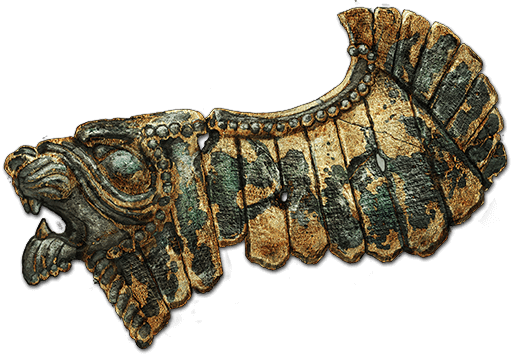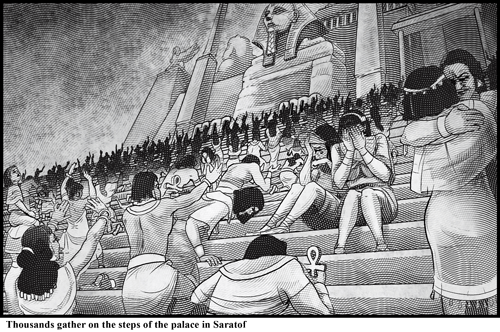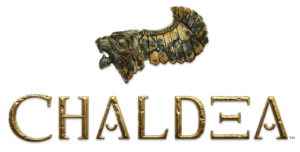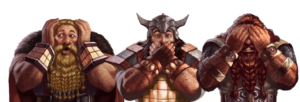
Sprecks Spivey, Augstat, Hesse
NEWSFLASH: Kordaava, god-emperor of Chaldea, has died, according to Imperial sources, the Kordavan Informant learned this morning.
SARATOF, ROOSH—Marcosta Kordaava, god-emperor of Chaldea, was found early this morning on the Pa-Neck Throne, impaled through the heart by the Spear of Set.
The emperor’s routines within the palace are scheduled and well documented, posted each morning in the main quad. According to Hapu, the Imperial Palace butler, this day began as any other. Emperor Kordaava rose early, well before the sun, and proceeded to the throne room for morning prayers and divine inspiration, communing with his god, Set.
“Alone. Always alone,” said Hapu when pressed if the emperor had been alone or attended. “He demands solitude to commune with his god. I would never interrupt his religious practices. No one would dare. Yes, quite alone except, of course, for his personal guards, the drasildar.”
Twenty drasildar are known to guard the Imperial throne room. In the forty years since Kordaava declared the world of Chaldea his empire, those twenty have not left his side. Of the one hundred total drasildar, eighty are scattered around the empire to protect vital Imperial assets. All are vigilant as stone, said to be neither bored by time nor bothered by the change of seasons.
The critical question is how an assassin could sneak by these mighty guardians, who have been described as having “the nose of a dragon, the eyes of a demon, and the temperament of both.”
“Getting past the notice of the drasildar guard is quite impossible,” said a senior court official who asked to remain nameless. Yet that is exactly what happened, as witnesses confirm.
“Thunderous demonic wails shook me out of bed,” wept Hapu. “I thought the world was ending. I rushed to the throne room but was kept at bay by the drasildar. They were angrier than anyone had ever seen them. Screaming, bellowing, pounding the floor with their fists in fury and hate.”
Corpses littered the palace. Blood stained the floors, walls, and ceiling.
“It was a gruesome sight,” Hapu said. “Just horrible.”
As of this reporting, the drasildar have not allowed anyone to enter the throne room. They protect the emperor even in death, it seems.
The people of Saratof are stunned by the incomprehensible gravity of this act.
“It’s a loss to the world,” cried a priest of Set.
“He made us feel safe,” said another.
Multitudes of mourners have already gathered to grieve for the late emperor. Thousands have flooded the streets of Saratof to make their way to the Imperial Palace, where clerics of Set are holding round-the-clock vigils. Additionally, the streets are packed with devout worshippers of both Kordaava and Set, all eager to pay their respects and get a glimpse of the palace where Kordaava died.
“What a tragedy,” Hapu said, wiping his red eyes. “The world will never see his like again.”
On a personal note, I would like to add the following.
Mortals live and die—it’s the circle of life we’ve all come to accept. We are born. We live the life given to us as best we can. And gods willing, one day, after a long and fruitful life, we pass on. But gods, divine entities—they endure, untouched by age, unsullied by the ephemeral universe. What does it truly mean when a god dies? We have no way of knowing.
I have at times been critical of our late emperor. After all, he forged his empire through war, forcing kings, queens, konigins, jarls, patesis, grand princes, malikahs, pixie queens, giant clan chieftains, and even elder dragons to bend the knee. Worse, perhaps, he forced the entire world to worship his god, Set, and to forsake the worship of other deities.
But in the forty years since all that occurred, the world of Chaldea has enjoyed unprecedented levels of peace, prosperity, fertility, and justice. And since those early hawkish days, Kordaava has stunned us all with his skills of transitioning from a violent warlord into a wise statesman. Yet throughout this maturation, he never lost his tremendous physical presence and the confidence it inspired. There are powerful and dangerous forces at work in Chaldea, but Kordaava always seemed like someone who could keep those forces under control.
Simply stated, the death of Kordaava is a tragedy like no other. What will happen now? To the empire? To the world? Undoubtedly, a new emperor or empress will arise. Will he or she keep the people of Chaldea together? Will a new ruler keep us safe? Or will we plunge back into darkness and dismay?
As tyrants go, Kordaava was the best one could hope for.
“They didn’t just kill Kordaava,” Hapu said with a heavy sigh. “They killed the world.”
Since no one has claimed responsibility for the assassination—no one credible, that is; there are always a few lunatics seeking glory—we have no idea about the assassin’s great purpose. Was it a subject who felt unjustly treated? Or perhaps the result of a vendetta against Set? Or if Set himself was responsible, then why? Or did some random elder dragon become jealous that Kordaava managed to do what they could not?
We don’t know, and the assassin remains at large. Imperial authorities have declared martial law and are bringing the full resources of the empire to bear in an attempt to uncover the plot and find the perpetrator.
No one can say with any certainty if the assassin or assassins will be found and brought to justice. Ever.
Let us hope and pray these killers do not strike twice.


Psionic Syndicate to Investigate Emperor Kordaava’s Assassination
Given that Kordaava was killed in his throne room and that Amandella Xune was head of palace security, Amandella is under intense scrutiny regarding the emperor’s assassination. She is tasked with two unenviable tasks: clearing her own name while trying to determine the real killer. Her enthusiasm is understandable, but some are questioning her tactics, which include using the powerful Taxian psionic syndicate to conduct mental interrogations of anyone potentially connected to the crime, from the palace’s cooking staff to Imperial senators. Emperor Kordaava had strictly forbidden and outlawed psionic interrogation, describing it as the highest form of personal intrusion. Additionally, brute-force mind invasions run the risk of causing permanent mental damage, and a few deaths and insanities are considered inevitable. With the emperor’s death still so recent and painful, everyone deals with the loss in their individual ways, but observers still note that the government is already superseding laws the emperor would have undoubtedly disapproved of.
Council of Consuls Grants Tihomir and Tarsis Broad Powers
The Imperial Consul of the Senate, Bogoslav Tihomir, convened an emergency session of the Council of Consuls three days after Emperor Kordaava’s assassination to form an interim government. Under Kordaava, the Council of Consuls was formed to manage the day-to-day affairs of state for the Kordaavan Empire. At present, there are nineteen Imperial consuls, each of whom is also an Imperial senator with vast administrative powers over various fields, such as economics, taxation, military, religion, and commerce. The council is chaired by Tihomir in his capacity as the Imperial Consul of the Senate. The council granted Tihomir the status of acting emperor until the full Senate can convene and elect the next official emperor, assuming Kordaava doesn’t miraculously do what gods do on occasion and return from the grave. The council also granted Tarsis command of all of Kordaava’s legions; Tarsis is the legatus of the Imperial Guard Legion and is also the Imperial Consul of the Military.
Drasildar Loyal to Kordaava, Even in Death
One of the many questions looming over the emperor’s death is, how did the assassin get past the twenty drasildar who guard the emperor at all times? Without insight into why the drasildar were loyal to the emperor in the first place, it’s impossible to dismiss them as somehow abetting the crime. While their involvement or complacency in the assassination is perhaps unknowable, their reaction after the crime was clear: fanatical outrage. The emperor’s personal guardians have stationed themselves around the throne where Kordaava sits, dead, impaled to the throne by the Spear of Set. They may have failed to protect his life, but they are determined to protect his body in death. Since their arrival, the drasildar have answered to no one except the emperor himself, and now they refuse to allow anyone to inspect the emperor’s corpse or the scene of the crime, raising questions about how, where, or when the late emperor will be interred.
Did Set Kill Kordaava?
Governor Hellwig von Gustavus certainly thinks this is the case. In an exclusive interview with The Kordavan Informant, Gustavus shared his reasoning. “First, Kordaava was a demigod guarded by twenty drasildar. Even if an elder dragon or another demigod attacked him, it would have been an epic battle that would have rocked the palace, if not the entire capital—pretty gods damned hard to ignore. The only being powerful enough to stroll in, neutralize the drasildar, and kill Kordaava in a single blow would have been an even more powerful god. Second, Kordaava was killed by his own spear—not just any spear but a divine artifact spear of Set, awarded to Kordaava by Set himself. I assert, therefore, that only Set could have summoned the spear from Kordaava’s grasp. It’s doubtful another deity could have done so. Odin or Zeus perhaps, but what are the odds of that? Third, Kordaava was slain while seated. So, the assassin had to have been someone Kordaava knew and trusted to allow such a familiar meeting. His morning schedule was well documented, spending his early morning hours communing with whom? Whom, indeed, hmm? Set, that’s who.” Gustavus has demanded that Menbit Hulsan, the head of the church of Set in Chaldea, be arrested and called to testify—a demand that has so far been ignored.
Hessen Military Prepares for War with Niesse
Reiswitz von Gustavus, the legatus of the 10th Legion and son of Governor Gustavus, has mobilized the 10th Legion and its auxilia, placing the military on high alert. In what is obviously a coordinated decision, Grand Master Kane Kurig, commander of the Hecks, a joint military force of the knight orders of Hesse, Munchkein, Stollhofen, Tetonique, and the Dwarven Host of Stollhofen, has ordered all these units to call their soldiers to arms. Gustavus and Kurig believe that without Kordaava to keep Sureniel in check, the orc empire of Niesse will beat the drums of war.
Gerhard von Rusdorf the Tall Crowned Konig of Hesse
If not for the momentous assassination of Emperor Kordaava, the news of Konig Rusdorf’s coronation would have dominated the headlines and tavern gossip and kaffeeklatsch from Boars Kriese to Enchantments Guard. While there remain legitimate concerns regarding the direction his reign might take, Hessen nobility in general are pleased that no one is contesting the throne (yet) in what looks to be (for now) a peaceful transition of power.



Issue #108





